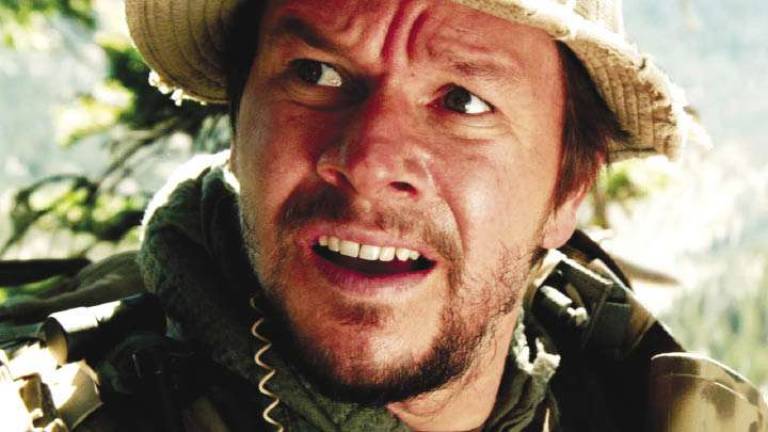Cluster-Clich

Lone Survivor opens with one of those bloody, scarifying, WTF chaos scenes of a wounded Lutrell then flashes-back to show how. This narrative cliché is inured to how we might sensitively view the horrors of war. Unable to different Wahlberg's Luttrell from potential body bag filler, the opening is a blur of overused action tropes favored by TV commercial hacks attempting to get familiar ideas across as quickly as possible.
Next, Berg's unsophisticated montage of rigorous and harrowing Navy SEAL training (where many candidates wash-out) inexpressively conveys the Tuff Mutha idea of military stoicism. As one visual cliché follows another, the men never become characters. Lone Survivor breaks down into elongated missions and interactions with vicious Afghan war lords and their sheepish-goatish-cowed people leading to an ultimate cluster-cliché.
Only in esthetic terms are our Afghanistan and Iraq wars not quagmires. David O. Russell's Three Kings individualized the personalities and histories of his soldiers and made the film cautionary, satiric as well as a panoply of American interests and behaviors. Robert Winkler's Home of the Brave personalized veteran's post-war shock of battle fatigue as did James Sheridan's Brothers with its marvelous intermixed metaphor of global fratricide. Nick Broomfield's Battle of Haditha remains the most powerful and strategically complex of the films to deal with the inherent absurdity and inhumanity of occupation-and-self-defense. Even shallow, offensive, demonizing films like In the Valley of Elah or Kimberly Peirce's vague-sentimental Stop-Loss were more visually and dramatically sure-footed than Lone Survivor.
Berg's style--and his problem--centers on a non-craftsman's pathetic unoriginal handling of imagery and character. Going along with the TV and commercials and video games revolution, Berg brings zero cinematic craft to his attempts at seriously conveying the visual and emotional experience of war. Perhaps Berg's clichés are related to our news media's refusal to visualize combat as well as the average Hollywood-American's alienation from military service and activity. All of that is at issue in Lone Survivor. It is not only incompetent, it lacks effect.
Follow Armond White on Twitter at 3xchair